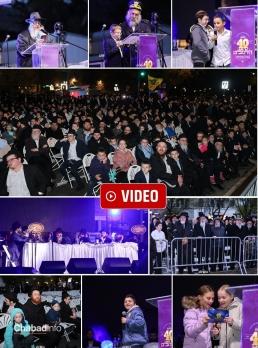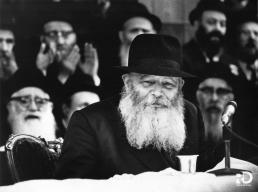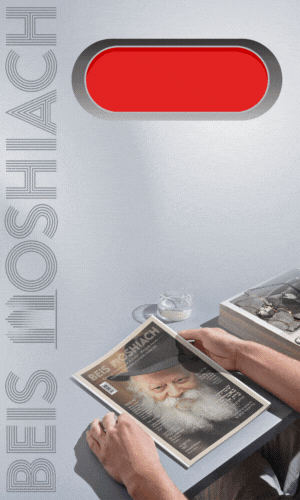“I’m Going Up To Heaven” • Historic Overview
In connection with Beis Nissan, we are republishing an article from the Beis Moshiach Magazine that depicts a moving account of the Rebbe Rashab’s final days in this world, based on Rabbi Moshe Dovber Rivkin’s diary Ashkavta D’Rebbi • Full Article
In connection with Beis Nissan, we are republishing an article from the Beis Moshiach Magazine that depicts a moving account of the Rebbe Rashab’s final days in this world, based on Rabbi Moshe Dovber Rivkin’s diary Ashkavta D’Rebbi.
***
Menachem Ziegelbaum, Beis Moshiach
– PART I –
“I am still completely under the influence of the awesome and powerful impressions of the last days, hours and moments of our Rebbe nishmaso eden, in this world, as I merited then to be the only one to stand at his bedside throughout the final days before his passing, i.e. the final week, from motzoei Shabbos parshas Vayakhel-Pikudei, 23 Adar, until the holy ark was hidden away on the first day of the week of Tzav, 2 Nissan …”
This was written by the Chassid, Rabbi Moshe Dovber Rivkin, in the introduction to his published diary called Ashkavta D’Rebbi, in which he describes the order of events of the passing of the Rebbe Rashab from the vantage point of someone who was actually present. As he writes there:
“In reviewing these notes, that entire awesome episode is as if it is passing and standing live again before my very eyes, with all of its distressing experiences, the story of the days and moments that I stood before the bed of Rabeinu nishmaso eden, at the time that he delivered his holy soul to the G-d of all spirits, with holiness and purity…”
– PART II –
The many Chassidim who surrounded the large farbrengen table in the home of the Rebbe Rashab on Purim 5680/1920 did not know that this farbrengen was sort of a goodbye farbrengen, since the entire series of events associated with this farbrengen were beyond the rules of nature.
The Chassidim who attended the Purim farbrengen in his home were warned that the Rebbe would say a maamar Chassidus and immediately after, everyone was to go home. However, the Rebbe surprised the Chassidim and on his own initiative extended the farbrengen for hours into the night, in an atmosphere of great joy and celebration.
When he returned to his room toward morning, the “court rav,” Rabbi Yaakov Landau, followed him. He was in such a state of excitement that he could not restrain himself and he blessed the Rebbe emotionally, saying, “May Hashem grant that next year we merit to also rejoice together with the Rebbe in Lubavitch.” The Rebbe did not react. Even when he repeated his blessing, the Rebbe said nothing. When he said it a third time, as though to insist on his blessing, the Rebbe said, “May Hashem grant that we be in close proximity spiritually.”
This was surprising as this was not the way he usually spoke. R’ Landau interpreted it as the Rebbe intending to leave the country, as per the invitation that was sent at that time from leading members of Anash, asking him to settle outside of Russia. Nobody imagined what the Rebbe was really hinting at.
– PART III –
It was Adar and a happy time. The Rebbe Rashab led his Chassidim with authority and in good health (relatively speaking, for throughout the years of his leadership he often traveled to health resorts). Nobody anticipated his sudden deterioration. It began on Thursday night, 21 Adar, 1920. The Rebbe looked fatigued and a strange weakness took hold of him. That evening, he still walked downstairs to his son’s apartment (who lived directly underneath), to visit his daughter-in-law, Rebbetzin Nechama Dina, who was sick. He sat in her apartment for fifteen minutes and then went back upstairs and went to rest.
He woke up suddenly in the middle of the night, not feeling well. His granddaughter, Rebbetzin Chaya Mushka, the Rebbe’s wife-to-be, rushed to bring him a cup of milk.
The next day, Friday morning, the Rebbe’s pains grew stronger and his temperature began to spike. Most of the time he lay in bed, fatigued. Rebbetzin Shterna Sarah asked his permission to call Dr. Landau, the doctor that was close to the family, but the Rebbe waved his hand in dismissal. It was only when his wife importuned him that the Rebbe agreed. After examining him, the doctor concluded that it was mild case of influenza (the flu) and calmed everyone down.
On motzoei Shabbos, after havdala, the Rebbe wanted to smoke but suddenly felt unwell and nearly fainted. The people present sprinkled cold water on him and rushed to call a doctor. The sense in the room was that something really bad was happening despite the reassuring diagnosis of Dr. Landau.
During the night, the Rebbe grew weaker. It was a strange weakness that was so overwhelming that “and he no longer had strength except to lie down, to get up and sit, and to stand when he needed to.” Suddenly, the Rebbe couldn’t stand on his own and had to be supported on his right. It was Rabbi Rivkin who had the privilege, along with the Rebbe’s son, both of whom did not move from the Rebbe’s room.
Sunday morning, 24 Adar, the Rebbe needed help to wash his holy hands. R’ Rivkin rushed to approach and serve the Rebbe. It is very powerful to read his description of how the Rebbe said the “ordinary” bracha “al netilas yodayim.”
“After I poured the water for him, alternating it three times, he began reciting the ‘al netilas yodayim’ bracha with great concentration and spent a long time on each word. When he reached the words ‘al netilas yodayim,’ he raised his hands to his head so that his fingertips were nearly touching and his head was lowered a bit, and he continued and drew out at length the words ‘al netilas yadayim’ with tremendous concentration. As he said the bracha, his eyes were closed and his forehead was creased – like at times of deep thinking..”
After another visit from Dr. Landau, the Rebbe wanted to daven shacharis. Wrapping the tallis and putting on tefillin were already difficult for him and he was helped by his son and R’ Rivkin. Although it entailed much effort, the Rebbe was particular to wrap the tallis according to Chabad custom, with all of its details and particulars. The davening itself he did partially sitting and partially standing while R’ Rivkin held the siddur in front of him. When the Rebbe finished a page, the aide would turn to the next page. Even under these circumstances, the Rebbe was particular about uttering it word by word from the words printed in the siddur.
The Rebbe said the entire davening with dveikus and a quiet tune, being careful with the various customs. The Rebbe was even particular about putting on all four pairs of his tefillin, as always.
– PART IV –
Throughout the week, Dr. Landau and other expert doctors were at the Rebbe’s bedside. It was amazing to see the behavior of these other doctors, for although they were not previously familiar with the Rebbe’s greatness, they stood before him with utter subservience. They did all they could to carry out his wishes “and would tremble in response to his every movement like one of the most mekushar of Anash.”
Some of them did not budge from the Rebbe’s bedside day and night, and with tremendous devotion they did everything to ease his pain.
On Monday morning, Professor Zavadsky came and he carried out a series of tests. At the end of his examination, the doctor entered the study where the Rebbetzin and Rayatz were waiting together with the Chassid, Rabbi Shmuel Gurary. The doctor was grim in his diagnosis, and said he was afraid it was typhus, a contagious, dangerous disease.
Anash and the tmimim quickly realized that this wasn’t an ordinary case of fatigue, but matters were serious. They all committed to fasting on Monday and to increase in saying Tehillim. A minyan was arranged with a Torah reading as is customary on a fast day with the reciting of “vayechal Moshe.”
Every night, a minyan of senior Anash gathered in the home of the Chassid, Rabbi Yaakov Tuvia Gebber, and they said Tehillim all night with an outpouring of the soul and pleading for great mercies that Hashem send a complete recovery to the Rebbe.
On Shabbos, parshas Vayikra, when the situation was dire, the rav of Rostov, Rabbi Berman, said to announce in all the city’s shuls and battei medrash that all the residents should return to their shuls in the afternoon to recite Tehillim and ask for mercy for the Rebbe; nobody should be absent!
Shabbos afternoon, thousands of Jews gathered and filled the shuls and various minyanim, and poured forth their prayers that He send a refuah shleima speedily to the Rebbe, Rabbi Shlomo Dovber ben Rivka.
For most of the day, the Rebbe lay in bed, semi-conscious and suffering in pain. Near the Rebbe sat R’ Berel Rivkin with Yaakov Isaac Balanter nearby while the doctor would come in and out.
At ten at night, the Rebbe suddenly woke up and began talking loudly. It seemed as though he was in the middle of something. The two approached the bed to hear what he was saying and his pained voice was heard clearly, talking deep inyanei Chassidus, about bittul b’metzius.
In the meantime, Dr. Lazinsky came in and when he saw that the Rebbe was involved in Torah and Chassidus, something the doctors had forbade entirely due to the strain on the brain, the doctor begged of him, “Rebbe, now is not the time to speak Torah; now it is time to rest. When you will be healthy, you will say a lot of divrei Torah.”
The Rebbe said, “For that we need health.”
Either way,, the Rebbe did stop what he was saying and did not speak again. “And I and Yaakov Isaac were very astounded by the words, and our hearts fell within us.”
– PART VI –
Friday morning, there was another meeting of the doctors including Dr. Landau, Dr. Rabinowitz, Dr. Lazinsky, and Dr. Mirsky, with the special participation of the renowned specialist, Professor Kastorian. Together, they made a medical assessment and realized that the situation was the worst case. They came up with a protocol of treatment, to at least ease things for the Rebbe to the extent possible.
A few minutes before Shabbos commenced, the Rebbe said to call for his Rebbetzin and asked her to cut his nails a bit in honor of Shabbos, as per his custom according to the halacha. The Rebbetzin said it was too late and it should be done on Sunday.
The Rebbe motioned with his hand, in a cross between dismissal and despair and said, “Sunday?” as though to say, who knows what will happen by Sunday.
“Nu,” said the Rebbe in a weak voice, “it is time to light Shabbos candles.”
On Shabbos, his weakness increased by the hour. At five in the afternoon, Rabbi Tzvi Gurary entered the room and stood not far from the Rebbe’s bed. He did not take his eyes off the Rebbe. As he stood there, the Rebbe’s expression suddenly changed and began to become inflamed. His eyes seemed to bulge alarmingly, just like during times of extreme dveikus seen in the past.
The doctors were called in and they held his arm and checked his pulse. They did all they could to ease things for the Rebbe. Only afterward did they say that throughout Shabbos there was hardly any pulse. Although they knew that there was no hope, al pi teva, they refrained from saying so to the household and the Chassidim.
As the sun set, many of Anash gathered in the big room on the other side of the building, and began reciting Tehillim with heartrending cries.
***
Late in the evening, the Rebbe began saying choppy syllables in a quiet voice, as though speaking to himself. It was only with difficulty that they could hear the words, “hischabrus ‘yichuda ila’a’ b’yichuda tata’a’”, and the like.
Rayatz did not move from his father’s bedside. At ten at night of motzoei Shabbos, the Rebbe suddenly opened his eyes and looked at his son. His son got the hint and leaned closer to listen attentively to what his father said. Unlike the previous days, the Rebbe’s voice was clear. “I am ascending to heaven and I leave the writings with you. Take me to the zal (the yechidus room) and we will be together.”
Rayatz turned pale in fright. His father noticed this and continuing with the marvelous chinuch he had given him all his life, he said in loving rebuke, “Hispa’alus? Hispa’alus? Mochin! Mochin!”
Everyone present testified later that starting from that moment, Rayatz’s attitude changed instantly. From then on, he accepted events with amazing higher intellect. “It is clear to anyone who understands, that with these holy words he removed from his son the natural trait of emotionalism and infused him with lofty intellectual powers,” wrote R’ Rivkin in his notes.
The Rebbe was moved to the big zal, the room where he had sat and learned and from where his great light spread to the world. They placed his bed near the eastern wall with the head to the north and his feet toward the south.
It was late at night when his wife served him coffee. The Rebbe’s lips began to move though he was inaudible. When one of the mekuravim leaned over, he heard the Rebbe saying havdala. A frightening thought occurred to him that the Alter Rebbe made havdala over coffee a few hours before his passing, also on motzoei Shabbos.
Most of the time, the Rebbe lay with his eyes closed and the breaths were labored and filled with pain, “and every breath was issued with a terrible groan, which broke the bodies of each of Anash who were standing there.”
Meanwhile, news of the Rebbe’s condition spread among the Chassidim and many of Anash gathered quickly to say Tehillim with terrible crying. At that time it was decided to add a name and they added the name “Chaim” to the Rebbe.
A little after midnight a beis din of three of the great Chassidim was convened, consisting of Rabbi Shmuel Gurary, Rabbi Zalman Havlin, and Rabbi Yisrael Levin (Neveler). With a feeling like at the holiest moments of Yom Kippur, Anash and the tmimim approached one by one and willingly donated half a year or a year to the Rebbe’s life so Hashem would lengthen his days and years, for good and pleasant years.
A commotion was suddenly heard as Rebbetzin Shterna Sarah went over to the members of the beis din, wanting to give ten years of her life. The members of the beis din did not accept that much from her. The most was half a year or a year. After an emotional discussion, they agreed to accept two years of her life.
The door to the room opened and Rayatz exited to the street. For some time he stood near the staircase of the house while wearing a gartel, his head bent in sorrow, wrapped in his thoughts, and his lips murmuring a prayer or Tehillim. A terrible a bitter cry burst forth from his heart. Here and there, one could hear snatches of his bitter rendition of the Alter Rebbe’s niggun, the Dalet Bavos, which the Rebbe Rashab would use for davening on the Yomim Noraim.
After two in the morning, the Rebbe raised his hand as his lips moved. Rayatz, who had returned and was standing near the bed the entire time, his head bowed in great concern, realized that his father was about to bless him. He bowed his head even more until his father’s hands were on his head and his father blessed him.
Rayatz said, “Father, the children Chana, Mussia and Shaindel are here.” They were his three daughters. They approached the Rebbe and the Rebbe looked at them, his lips murmuring constantly.
Rayatz asked all those present to leave the room, aside from his family. Everyone went out, including the doctors. The time had come for the emotional parting from the family.
First, the oldest daughter Chana went over. The Rebbe looked at her with a sweet look, raised his hand while his son helped him by supporting his hand over her head, as he always did on erev Yom Kippur. The Rebbe blessed her and said, “yivorechecha” and other things they could not understand. He also blessed the other two daughters.
The Rebbe finished with the girls and then raised his hands over the head of his only child and blessed him.
Then Rayatz called for Shmaryahu Gurary, Rashag, who was engaged to his daughter, and the Rebbe blessed him as well.
The doctors and mekuravim came back into the room and Rayatz could not contain himself and went out to the hallway again, sat on a bench and burst into tears. R’ Berel Rivkin sat on a nearby bench too, exhausted. Rayatz got up and paced in an emotional turmoil. He suddenly stopped, and with his face aflame, he held R’ Rivkin by both shoulders and shouted, “Gevald Berel! We have hearts of stone!” and burst into tears again.
Rayatz continued to pace and then stopped and said to R’ Rivkin, “Berel, what do you say?”
R’ Berel stood there silently, also in an emotional turmoil. What could he say at this terrible time? He finally said quietly, “Only Hashem can help.”
Rayatz went into his father’s room and stood near the bed. His stance was identical to the way he stood all the years facing his father, when he said Chassidus, with total bittul. The Rebbe lay there with his eyes tightly closed and his breathing labored. His breathing slowly weakened and nearly stopped.
A heartrending cry was heard, “Tatte, Tatte!”
The hearts of those present were ripped to shreds. The Rebbe weakly opened his eyes and looked at his son gently as though consoling him for the great pain…
Four in the morning. It was obviously his final moments. The Rebbe’s eyes were closed with tremendous dveikus and his breathing continuously weakened.
Once again, a cry rent the air, “Tatte, Tatte!”
The Rebbe opened his eyes again and looked compassionately at his son and then closed his eyes again. The doctors had stopped giving him injections. They knew it was futile.
The final time Rayatz cried out, “Tatte,” his father opened his eyes for the last time, looked at his only child and two large tears came from his eyes. Then he immediately closed his eyes.
One final small movement from the Rebbe, as he straightened his head and aligned his hands and feet, and then his holy soul soared heavenward…
Al those present began to cry out, “Shema Yisrael” and their sobs broke barriers and made worlds tremble.
As the Rebbe Rayatz later wrote in a letter to the Chassidim, “In the first month, on the second day, about twenty minutes before five, at dawn, the heavens opened and the pure soul ascended to return to her Father’s embrace. With a holy sweetness and majestic calm, our holy Rebbe gave over his soul… And the eyes of the merciful father were closed, to me, and to all my brothers educated in the house of G-d, and in one instant I became an orphan, me, you his students, and together with us, the holy nation.”
– PART VII –
Sunday afternoon, the funeral left the Rebbe’s house to the large cemetery on the edge of Rostov. Those who did the tahara testifed that the Rebbe’s face remained lifelike the entire time, with a faint smile on his lips (as was related about Rashbi).
The coffin was made out of the boards of the bima in the beis medrash and from the Rebbe’s shtender. Aside from shrouds, the Rebbe was wrapped in his Shabbos tallis.
Only tmimim and a few ziknei Anash carried the coffin. The Chassidim davened mincha with the Rebbe Rayatz serving as chazan. That tefilla was remembered for years to come, a prayer said with great sobbing.
After maariv, when everyone went home except for a few mekuravim of Beis Rebbi, the Rebbe Rayatz pulled aside R’ Rivkin, who had spent the final week with his father, and spoke to him for two hours while crying nonstop. “Now I see that everything my father said to me in the past half a year were all a preparation for this time,” said the Rebbe with a terrible tone of voice. “And I never anticipated such a thing.”
“Gevald, gevald! Where was my understanding? All winter he told me clearly and in detail that he would be passing away and I did not understand.”
Right after the shiva, the Rebbe Rayatz spent days in his room. Aside from the tefillos that he led, he spent most of the time in his room, writing Chassidus and letters of chizuk and leadership to Anash and the tmimim, even though he had yet to agree to officially take on the mantle of leadership. His father had left him to fight a war of light against darkness, of faith against heresy and the Rebbe Rayatz waged it with courage and determination throughout his reign.
*
The magazine can be obtained in stores around Crown Heights. To purchase a subscription, please go to: bmoshiach.org
228
Join ChabadInfo's News Roundup and alerts for the HOTTEST Chabad news and updates!











































